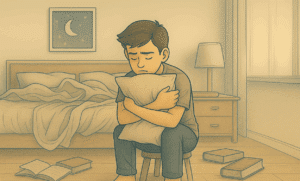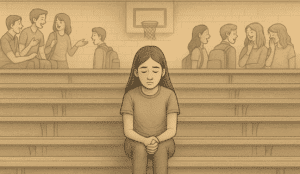Impact of Bullying on Teens
As a parent, you might have noticed your teen seems different lately—maybe more withdrawn, anxious, or uninterested in activities they once loved. Perhaps their grades have dropped, or you’ve heard them make self-deprecating comments.
If any of this resonates with you, it might be a sign of bullying. The effects of bullying on teens can be far more profound than we often realize. It not only chips away at their self-esteem and mood but also hinders their ability to succeed in school and create healthy relationships.
In this blog, we’ll explore the various ways bullying affects teens’ mental health, how you can recognize the signs, and what you can do to help your child. We’ll also discuss strategies for stopping bullying at school and home, and how Mission Prep Healthcare can support your teen in recovering from the emotional toll bullying can take.
What Does Bullying Look Like in Teens?
Bullying goes beyond physical confrontations; it can show up in various forms, from hurtful words to the insidious reach of cyberbullying, which has surged with the rise of social media.
But what does bullying really look like for today’s teens? It often takes shape in ways that parents and caregivers might not recognize at first glance, hiding in plain sight but impacting lives all the same.
Your teen may not come home with physical injuries, but they might withdraw from social activities, become more anxious, or stop engaging in hobbies they once loved.
Some other signs of bullying effects on teens include:
- a noticeable drop in grades
- changes in sleep patterns
- unexplained mood swings
- Being more secretive, (especially about their online activity)
It’s important to know that bullying is not always physical. Verbal and emotional bullying—such as name-calling, exclusion from peer groups, or relentless teasing—can be just as harmful to a teen’s self-esteem and mental health.
The Mental Health Impact of Bullying on Teens
Bullying doesn’t just hurt in the moment—it can have long-lasting impacts on a teen’s mental health. Research has shown that teens who are bullied are at a higher risk of developing mental health issues such as depression, anxiety, and even post-traumatic stress disorder (PTSD).
They may struggle with feelings of worthlessness, shame, and loneliness. Over time, these issues can contribute to a variety of challenges, including low self-esteem and difficulty forming healthy relationships later in life.
The effects of bullying on teens can also show up in physical ways. A teen suffering from bullying might complain of frequent headaches, stomachaches, or other stress-related physical symptoms.
In some cases, they might turn to harmful coping mechanisms like substance use, or worse, develop suicidal thoughts.
It’s important to take these signs seriously. The emotional scars from bullying can last well beyond the school years, impacting your teen’s confidence and overall mental health as they transition into adulthood.
How to Stop Bullying in Schools and at Home
Bullying is a widespread issue, but there are steps we can take to reduce its impact and stop it from happening in the first place.
If you’re wondering how to stop bullying in schools, the first step is to create open communication with your teen. Encourage them to talk about their day, their relationships with others, and any issues they might be facing. Sometimes, just knowing they have a trusted adult to turn to can make a world of difference.
Schools also play a critical role in preventing bullying. Anti-bullying policies should be in place, and teachers and administrators need to be trained to recognize and intervene when bullying occurs. Encouraging students to stand up against bullying, rather than being bystanders, is also key. Peer support can be a powerful tool in stopping bullying before it escalates.
At home, parents and caregivers can support their teens by offering a safe space to express emotions and by modeling healthy coping strategies. It’s important to remind your teen that bullying is not their fault, and there are steps they can take to protect themselves, such as avoiding situations that make them uncomfortable or speaking to a trusted adult about the issue.
What to Do If Your Teen is Being Bullied
If you suspect your teen is being bullied, it’s important to act quickly. Start by having an open and supportive conversation. Ask them directly about what’s happening at school or online, and be sure to listen without judgment. Your teen may be scared or embarrassed to talk about their experiences, so it’s important to be patient and reassuring.
Once you know the extent of the situation, work with your teen to report the bullying to school authorities. Most schools have policies in place to handle bullying, and they can help make sure your teen feels safe in the school environment.
If the bullying is happening online, encourage your teen to block the individual responsible and report any inappropriate behavior to the platform administrators.
In addition to addressing the immediate issue, it’s important to think about long-term mental health support. Bullying can leave emotional scars, and therapy or counseling can help your teen process their experiences and develop healthy coping mechanisms. Don’t hesitate to reach out for professional help if needed—sometimes the damage bullying causes requires a bit more than just time to heal.
How Mission Prep Healthcare Can Help
At Mission Prep Healthcare, we understand how deeply the effects of bullying on teens can impact not only their mental health but also their ability to succeed academically and socially. That’s why we offer specialized programs designed to address the unique challenges teens face, including those related to bullying.
Our comprehensive adolescent mental health programs include individual therapy, family counseling, and social challenge programs that help teens rebuild their confidence and develop stronger social skills.
Through our holistic approach, we aim to give teens and their families the foundation they need to heal and move forward.
At Mission Prep, we’re not just focused on treating the symptoms of bullying—we’re committed to helping your teen thrive emotionally, socially, and academically. If your family is struggling with the effects of bullying, we’re here to support you every step of the way.
Conclusion
Bullying is a serious issue that can have lasting consequences on a teen’s mental health and overall well-being. By understanding the effects of bullying on teens, recognizing the warning signs, and taking proactive steps to stop it, you can help protect your child from long-term emotional harm.
If your teen is dealing with bullying and its impact on their mental health, don’t wait to seek help. Mission Prep Healthcare is here to provide the support and tools your family needs to overcome this challenge and move toward a healthier, more positive future. Together, we can work to ensure that your teen feels safe, supported, and empowered to succeed both inside and outside of school.


















